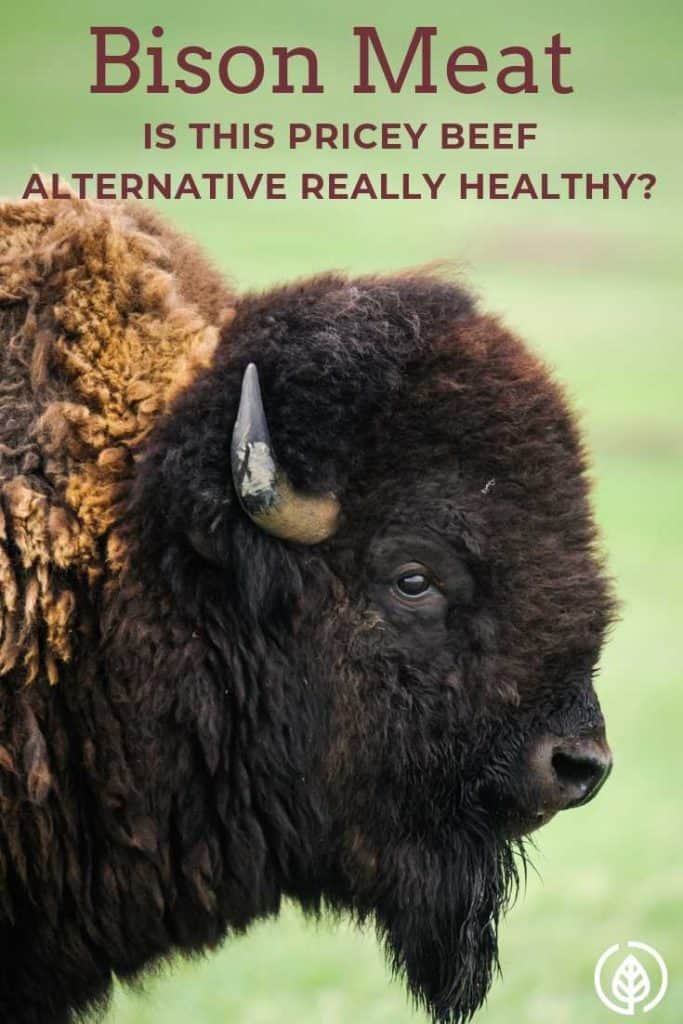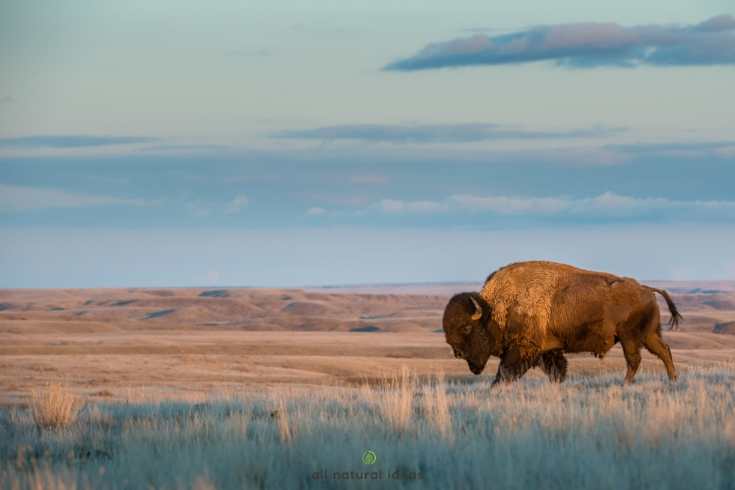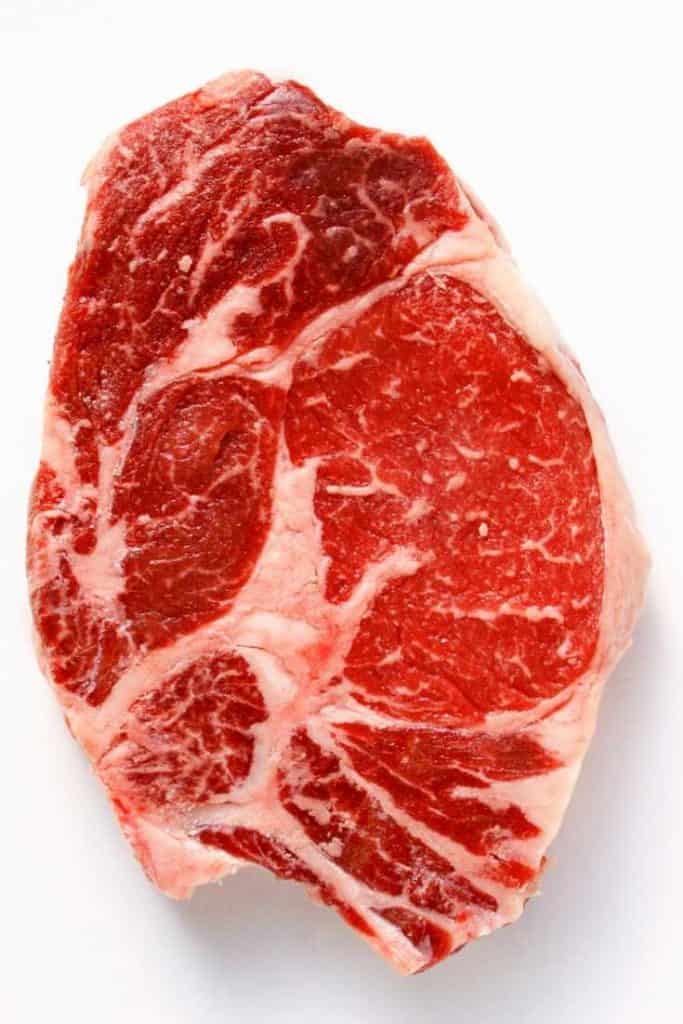Bison meat, once considered exotic, is now available at most local supermarkets. It’s believed to be healthier than beef. But this alternative red meat is far more expensive. Is the cost worth it?

Before we dive into the deep end of the prairie and learn about bison meat nutrition, let’s get something out of the way….
Are bison and buffalo the same thing?
Technically, no.
Many people use the two terms interchangeably. It’s easy to see why. Both creatures look like oxen.
But here’s the easiest way to tell the difference between bison and buffalo meat. Bison sport big shaggy beards while buffaloes are beardless.
Here’s a few more differences:
- Buffalo have much longer horns.
- Bison have a hump in their shoulders; buffalo have no humps.
- Buffalo species only live in Africa and Asia. (Water buffaloes are native to Asia; Cape Buffaloes are found in Africa.) [SOURCE]
Got it? So next time you’re at a barbecue and you hear someone say “buffalo meat,” you can be that person who says, “Actually, that’s American bison not buffalo….”
Now that that’s out of the way, let’s move on to the juicy question:
What is bison meat?
For starters, it’s not buffalo. (Now that you know the difference between the two species, you understand why, right?)
In a nutshell, it just might be better for your health than beef. There’s a big difference health-wise between grain-fed and grass-fed beef. But it’s probably better for you even when compared to grass-fed beef.
(We’ll explore the differences between these two red meats in just a bit….)
It’s also better for the environment. In terms of animal welfare, they are generally better treated than cattle, especially grain-fed conventional cows. Unlike cattle, they are never administered hormones or antibiotics.
As for its appearance and taste, it’s darker than beef. Taste-wise, it’s sweeter than cattle. As for mouthfeel, the ground meat is a bit drier and not as fatty as cattle.
When you’re in a supermarket that sells it, the biggest thing you’ll notice is the price difference. Bison meat is much more expensive than beef.
Why? It’s simple supply and demand. There are far fewer heads of it than beef.
In all of North America, there are only about 350,000 of the animals.
Compare that to almost 94 million cattle in the USA alone (in 2017). [SOURCE]
Of course, the main reason there’s relatively few of them in comparison to cattle is the genocidal campaign against Native Americans. In fact, there were once over 30 million roaming North America during the 1800s. But by the 1880s, the number was fewer than 2,000.
Thanks to conservation efforts (mostly private), numbers have steadily rebounded. Albeit, the main reason is not necessarily because of pure conservation, but rather for the meat.
According to the National Bison Association, sales of this meat in 2017 was $350 million in restaurants and retail stores. [SOURCE]

What are the benefits?
Sales of it are a mere drop in the feed bucket compared to cattle. But it’s the demand for healthier proteins that are nonetheless fueling the rise of this beef alternative.
Red meat is a double-edged nutritional sword. On one hand, grass-fed is considered a smart fat by some nutrition experts.
On the other hand, the consumption of red meat may be associated with a higher risk of certain cancers. Colorectal cancer is the main concern with eating lots of it—especially processed cuts like bacon. [SOURCE]
And this is precisely why demand for bison meat is steadily increasing. Some people are even willing to spend $9 per pound for a pound of ground bison meat at their nearest WalMart.
How Much Healthier Is It Than Beef?
It depends. Rocky Mountain Natural Meats, a Colorado-based purveyor of buffalo meat (ok, technically it’s not buffalo, but we’ll let it slide for now), back in 2010 recalled over 66,000 pounds of ground and tenderized steaks because of e. Coli contamination.
Even though it’s leaner than beef, you wouldn’t want to eat it if was contaminated.
The problem, as Berkeley Wellness points out is that as demand for buffalo meat has risen, some ranchers are “finishing” the the animals with grain before slaughter. The reason why ranchers are doing this is to make the appearance and texture similar to beef. In particular, the fatty mouthfeel.
Nonetheless, Berkeley adds that regardless of whether it’s 100% grass-fed or grain-finished, bison meat is almost always leaner than beef. Bison ranches are also considered far more environmentally-sustainable than cattle farms.
Both lean and ground contain less fat than beef. Lean buffalo meat has 2.4 grams of fat per 100 grams; there’s 7.2 grams in ground bison meat.
In comparison, lean and ground beef contain 8.1 and 10.0 g of fat per 100 g, respectively.
The ground meat is higher in fat than lean steak cuts. There’s about 15 grams of fat along with 240 calories in a 3.5-ounce serving of ground.
But the big selling point of buffalo burgers is that they supposedly have healthier fats. Specifically, CLA (a healthy omega-6 fatty acid) and omega-3 fatty acids.
But the truth is you should probably be consuming less omega-6s to begin with. And, as Berkeley Wellness point out, even 100% grass-fed, bison has far less omega-3’s than wild salmon.
More Nutrition Facts
But for health-conscious people who can’t do without red meat, buffalo burgers are increasing in popularity. As an article in the journal, Animal Frontiers, puts it:
“Consumers are willing to pay significant premiums for bison steaks that are certified as being produced without hormones or growth-promoting agents.”
And like any source of red meat, there are also other health benefits such as the fact that it’s mineral-rich; it’s a good source of iron, selenium, and zinc. In fact, bison meat has slightly more iron than beef.
A small 2013 study in Nutrition Research presents some evidence that it is healthier than beef. Participants were fed a single 12-ounce serving of bison 6 days a week for 7 weeks. Then, the participants were given beef instead of buffalo.
The participants had several health markers measured, including levels of fat in the blood and cholesterol. In comparison to beef, the researchers determined that eating bison was less risky for developing hardening of the arteries.
So if you are going to eat red meat, it does seem like bison is the healthier choice. The amount of heart-healthy polyunsaturated fatty acids in bison is higher than that found in beef. In fact, bison has more polyunsaturated fat than both grain-fed and grass-fed cattle.

How do you cook bison ground meat?
Don’t cook it the same way you do beef. It’s actually easier to cook than beef. At least in terms of cooking time. That’s because since it’s not as fatty, it doesn’t take as long to cook.
If you like your red meat well-done, you may not like buffalo burgers that way. Buffalo meat really shouldn’t be cooked more than medium done. For steaks, you may actually want to cook it at a lower temperature (and for longer) than thick beefsteak cuts. This will ensure you don’t overcook bison steaks.
And if you’re making burgers, make sure the cooked meat has an internal temperature of 160 degrees (F). The inside of the meat should be slightly pink.
Bison ground beef tastes best when it’s cooked rare to medium-rare.
Where to buy
You can find it in most supermarkets these days. However, if you have the money to buy in bulk directly from a farm, you’ll save a lot of money.
Blackwing Meats and NorthStar Bison are a couple well-known ranches that sell buffalo meat in bulk.
And if you’re looking for ground bison meat recipes, you can simply access any beef recipe. Just remember not to cook the buffalo meat as long as you would beef.
Conclusion:
Eating it just for the heart-healthy fatty acids? Then you might just be better off eating more wild salmon.
But if you’re looking to reduce your carbon footprint and want a leaner red meat, go ahead and eat bison meat.
It appears to be, all in all, healthier than beef. Without doubt, it’s better for you than factory-farm beef.
References
Bison meat has a lower atherogenic risk than beef in healthy men
Nutrient profiles in retail cuts of bison meat
Blast chilling and low voltage electrical stimulation influences on bison meat quality
Bison meat: Characteristics, challenges, and opportunities
Is Bison Meat Better Than Beef?





